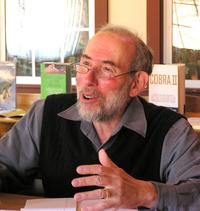David Halperin
Goodreads Author
Born
in Trenton, NJ, The United States
Website
Genre
Influences
Member Since
December 2010
More books by David Halperin…
“There is something odd, suspiciously odd, about the rapidity with which
queer theory–whose claim to radical politics derived from its anti-assimilationist
posture, from its shocking embrace of the abnormal and the marginal–has been
embraced by, canonized by, and absorbed into our (largely heterosexual) insti-
tutions of knowledge, as lesbian and gay studies never were. Despite its im-
plicit (and false) portrayal of lesbian and gay studies as liberal, assimilationist,
and accommodating of the status quo, queer theory has proven to be much
more congenial to established institutions of the liberal academy. The first step
was for the “theory” in queer theory to prevail over the “queer,” for “queer” to
become a harmless qualifier of “theory”: if it’s theory, progressive academics
seem to have reasoned, then it’s merely an extension of what important people
have already been doing all along. It can be folded back into the standard practice
of literary and cultural studies, without impeding academic business as usual. The
next step was to despecify the lesbian, gay, bisexual, transgender, or transgressive
content of queerness, thereby abstracting “queer” and turning it into a generic
badge of subversiveness, a more trendy version of “liberal”: if it’s queer, it’s
politically oppositional, so everyone who claims to be progressive has a vested interest in owning a share of it. Finally, queer theory, being a theory instead of
a discipline, posed no threat to the monopoly of the established disciplines: on
the contrary, queer theory could be incorporated into each of them, and it could
then be applied to topics in already established fields. Those working in En-
glish, history, classics, anthropology, sociology, or religion would now have
the option of using queer theory, as they had previously used Deconstruction,
to advance the practice of their disciplines–by “queering” them. The outcome
of those three moves was to make queer theory a game the whole family could
play. This has resulted in a paradoxical situation: as queer theory becomes
more widely diffused throughout the disciplines, it becomes harder to figure
out what’s so very queer about it, while lesbian and gay studies, which by con-
trast would seem to pertain only to lesbians and gay men, looks increasingly
backward, identitarian, and outdated.”
―
queer theory–whose claim to radical politics derived from its anti-assimilationist
posture, from its shocking embrace of the abnormal and the marginal–has been
embraced by, canonized by, and absorbed into our (largely heterosexual) insti-
tutions of knowledge, as lesbian and gay studies never were. Despite its im-
plicit (and false) portrayal of lesbian and gay studies as liberal, assimilationist,
and accommodating of the status quo, queer theory has proven to be much
more congenial to established institutions of the liberal academy. The first step
was for the “theory” in queer theory to prevail over the “queer,” for “queer” to
become a harmless qualifier of “theory”: if it’s theory, progressive academics
seem to have reasoned, then it’s merely an extension of what important people
have already been doing all along. It can be folded back into the standard practice
of literary and cultural studies, without impeding academic business as usual. The
next step was to despecify the lesbian, gay, bisexual, transgender, or transgressive
content of queerness, thereby abstracting “queer” and turning it into a generic
badge of subversiveness, a more trendy version of “liberal”: if it’s queer, it’s
politically oppositional, so everyone who claims to be progressive has a vested interest in owning a share of it. Finally, queer theory, being a theory instead of
a discipline, posed no threat to the monopoly of the established disciplines: on
the contrary, queer theory could be incorporated into each of them, and it could
then be applied to topics in already established fields. Those working in En-
glish, history, classics, anthropology, sociology, or religion would now have
the option of using queer theory, as they had previously used Deconstruction,
to advance the practice of their disciplines–by “queering” them. The outcome
of those three moves was to make queer theory a game the whole family could
play. This has resulted in a paradoxical situation: as queer theory becomes
more widely diffused throughout the disciplines, it becomes harder to figure
out what’s so very queer about it, while lesbian and gay studies, which by con-
trast would seem to pertain only to lesbians and gay men, looks increasingly
backward, identitarian, and outdated.”
―
Topics Mentioning This Author
| topics | posts | views | last activity | |
|---|---|---|---|---|
| What's the Name o...: YA Sci-Fi/ Fantasy. Stuff that a boy writes or draws in his Journal starts happening in real life. Strange men in suits follow him. Cover: notebook paper with doodles/ words around the title. Read around 2011-2014. | 7 | 132 | Mar 16, 2023 11:41AM |









































